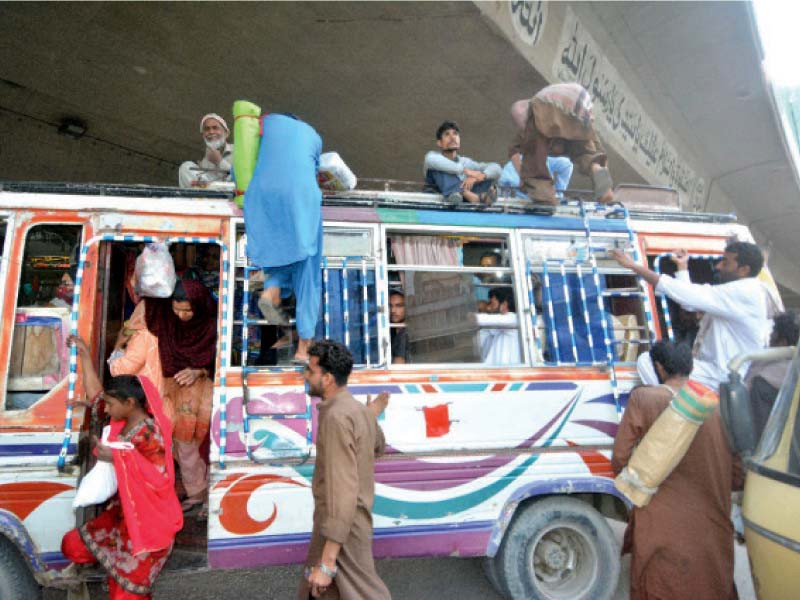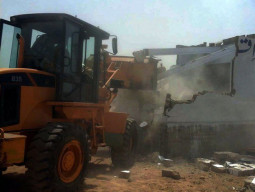
The National Command and Operation Center (NCOC), which serves as the nerve centre of the government’s anti-Covid-19 strategy, had laid down some very specific protocols and procedures to ensure the continuation of public transport amid pandemic. These included sanitisation of vehicles before every run, in addition to complete adherence to government SOPs such as social distancing and face-masking, at all times during transit.
Furthermore, towards the end of last year, the NCOC had announced launching a special nationwide inoculation campaign for the transportation sector. Under this campaign, all types of public and private intercity and intra-city transport were to be inspected at entry and exit points of bus stands, toll plazas and interchanges, and only allow vaccinated individuals onboard, whereas all those found to be unvaccinated were to be jabbed on spot via mobile vaccination teams.
However, by the fifth wave of Covid-19, it appears that public transportation has fallen from the agenda, with drivers and passengers alike showing no regard for government SOPs, while the government too appears to have let go of imposing its own protocols.
Similarly, private transport companies that were once actively handing out sanitisers and face masks to their drivers, in addition to educating them on anti-coronavirus protocols out of fear of a transportation shutdown, have also backed out of practice, seeing the government’s nonchalance in the year 2022.
“No one wears a mask anymore, and neither does anyone ever question it. Social distancing has also become a thing of the past, and it’s like Covid-19 does not exist anymore,” commented Waqas Ahmed, a driver for a mobile application-based bus service. Per Ahmed, his company has stopped keeping tabs on the observance of SOPs within the vehicle, so the passengers have also become more comfortable with flouting them.
However, public transport like privately-operated bus and ride-hailing services still seem to fare better owing to corporate policies, as compared to traditional, relatively unregulated, transportation options like local buses, rickshaws, and Chingchis.
“The worst offenders of SOP-flouting are the nine-seater Chingchi rickshaws, that load passengers like animals in a truck,” remarked Razia Bano, a resident of the city who relies on public transport as her daily mode of commute. “Let alone wearing masks, there is not even enough space in these vehicles to avoid breathing into each other’s face. They are catalysing the spread of the new Omicron variant, and those of us who don’t have access to more expensive modes of transport like ride-hailing services or private vehicles, are just left to take our chances with the disease,” she added.
Read More: Ban lifted on inter-provincial public transport
Speaking in this regard, Ijaz, who is a local Chingchi rickshaw driver maintained that anti-coronavirus SOPs are impossible to maintain in a nine-seater rickshaw, without losing significant business. Unwilling to contest the agitated passenger’s claims, he said that as a driver things are not in his hand. “I can’t force people to wear a mask or check their vaccination status. They will either start a squabble with me or just get on a different rickshaw, both ways I’ll just be losing potential commuters,” he reasoned.
Similarly, Rehan, who drives a local minibus also said that conditions on his bus are reflective of the government’s concerns. “During the first couple of waves, the authorities were stricter with imposing Covid-19 related SOPs, so passengers were more willing to comply. Now, there is no check from the authorities, so we too late things slide since we can’t possibly force anyone without starting a fight,” the driver commented.
While on the other hand, Muhammad Ijaz, a vaccinator tasked with jabbing people in the public transport sector, claimed that although the health department had set up multiple vaccination camps at various bus and rickshaw stands, passengers and drivers have both been equally reluctant about getting jabbed. “In this regard, we need the support of the district administration, without which the campaign has no chance,” he added.
Whereas, when approached for his comments, Karachi Transport Alliance President Irshad Bukhari maintained that the implementation of anti-coronavirus SOPs in public transport is the responsibility of the government. “We are ready to cooperate in any way we can to prevent the spread, but drivers on their own cannot ensure adherence to SOPs,” he asserted.
Addressing the matter, Sindh Information Minister Saeed Ghani said that the government is currently reviewing the situation in Karachi. “The Department of Transport is also taking steps in collaboration with the district administration to implement SOPs in public transport. The scope of the vaccination campaign in public transport will be expanded, but in the meanwhile people should not forsake SOPs,” he told The Express Tribune.
Published in The Express Tribune, February 8th, 2022.




1732256278-0/ellen-(1)1732256278-0-165x106.webp)
1725877703-0/Tribune-Pic-(5)1725877703-0-165x106.webp)















COMMENTS
Comments are moderated and generally will be posted if they are on-topic and not abusive.
For more information, please see our Comments FAQ